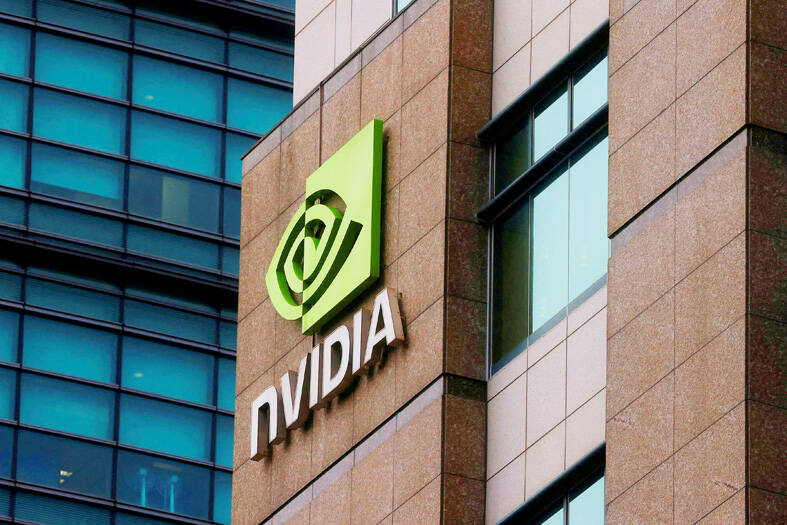Nvidia Corp plans to help build an artificial intelligence (AI) tech-related ecosystem in Japan to meet demand in a country eager to gain an edge in this emerging technology.
The US company will seek to partner with Japanese research organizations, companies and start-ups to build factories for AI, Nvidia CEO Jensen Huang (黃仁勳) said yesterday during opening remarks in a meeting with Japanese Minister of Economy, Trade and Industry Yasutoshi Nishimura.
The company is to set up an AI research laboratory, and invest in local start-ups and educate the public on using AI, Huang said.

Photo: Ann Wang, Reuters
Huang earlier this week met with Japanese Prime Minister Fumio Kishida and promised to do his best to prioritize Japan, local news reports said.
Tokyo is trying to regain tech leadership by leveraging its expertise in materials science and chipmaking tools, and by supplying billions of dollars in subsidies to ramp up local production of cutting-edge semiconductors. However, it has largely missed out on the lion’s share of profits related to generative AI so far. Huang said that Japan could build its own AI ecosystem.
“Japan has all of the technical expertise, the industrial capability to create your own artificial intelligence right here in Japan,” Huang told Nishimura, adding that the East Asian nation has decades of expertise in megatronics, manufacturing and robotics.
Japan can build its own AI infrastructure, harnessing Japanese data to create its own AI, he said.
Nvidia supplies chips to Japanese companies, including Softbank Corp, NEC Corp, Nippon Telegraph & Telephone Corp’s mobile and data services arms, as well as Sakura Internet Inc and Mitsui & Co, Huang said.
“For Japan to develop its own generative AI, we need Nvidia’s GPUs [graphics processing units]. We cannot do it without collaborating,” Nishimura said. “I’d like to see Japan lead the world in innovation through deepened partnership with Nvidia.”
Separately, Singapore plans to triple its pool of AI experts, including machine-learning scientists and engineers, to 15,000, as part of its national AI strategy, Singaporean Deputy Prime Minister Lawrence Wong (黃循財) said on Monday.
The Southeast Asian nation of 5.45 million, which is home to the Asian headquarters of global tech giants, such as Google owner Alphabet Inc and Microsoft Corp, said it would also work to boost its available high-performance computing resources by securing access through partnerships with chipmakers and cloud service providers.
Nvidia revenue for the quarter that ended in October included US$2.7 billion that originated from Singapore, trailing only the US, China and Taiwan, a company filing to the US Securities and Exchange Commission showed.
Singapore also pledged under its AI strategy to increase government incentives for the sector, including by backing accelerator programs for AI start-ups and encouraging companies to set up AI “centers of excellence,” ramp up local AI training programs and operate a supply of GPUs to be available to the country’s researchers.
Additional reporting by Reuters

SEEKING CLARITY: Washington should not adopt measures that create uncertainties for ‘existing semiconductor investments,’ TSMC said referring to its US$165 billion in the US Taiwan Semiconductor Manufacturing Co (TSMC, 台積電) told the US that any future tariffs on Taiwanese semiconductors could reduce demand for chips and derail its pledge to increase its investment in Arizona. “New import restrictions could jeopardize current US leadership in the competitive technology industry and create uncertainties for many committed semiconductor capital projects in the US, including TSMC Arizona’s significant investment plan in Phoenix,” the chipmaker wrote in a letter to the US Department of Commerce. TSMC issued the warning in response to a solicitation for comments by the department on a possible tariff on semiconductor imports by US President Donald Trump’s

The government has launched a three-pronged strategy to attract local and international talent, aiming to position Taiwan as a new global hub following Nvidia Corp’s announcement that it has chosen Taipei as the site of its Taiwan headquarters. Nvidia cofounder and CEO Jensen Huang (黃仁勳) on Monday last week announced during his keynote speech at the Computex trade show in Taipei that the Nvidia Constellation, the company’s planned Taiwan headquarters, would be located in the Beitou-Shilin Technology Park (北投士林科技園區) in Taipei. Huang’s decision to establish a base in Taiwan is “primarily due to Taiwan’s talent pool and its strength in the semiconductor

An earnings report from semiconductor giant and artificial intelligence (AI) bellwether Nvidia Corp takes center stage for Wall Street this week, as stocks hit a speed bump of worries over US federal deficits driving up Treasury yields. US equities pulled back last week after a torrid rally, as investors turned their attention to tax and spending legislation poised to swell the US government’s US$36 trillion in debt. Long-dated US Treasury yields rose amid the fiscal worries, with the 30-year yield topping 5 percent and hitting its highest level since late 2023. Stocks were dealt another blow on Friday when US President Donald

UNCERTAINTY: Investors remain worried that trade negotiations with Washington could go poorly, given Trump’s inconsistency on tariffs in his second term, experts said The consumer confidence index this month fell for a ninth consecutive month to its lowest level in 13 months, as global trade uncertainties and tariff risks cloud Taiwan’s economic outlook, a survey released yesterday by National Central University found. The biggest decline came from the timing for stock investments, which plunged 11.82 points to 26.82, underscoring bleak investor confidence, it said. “Although the TAIEX reclaimed the 21,000-point mark after the US and China agreed to bury the hatchet for 90 days, investors remain worried that the situation would turn sour later,” said Dachrahn Wu (吳大任), director of the university’s Research Center for